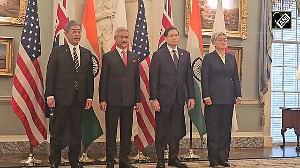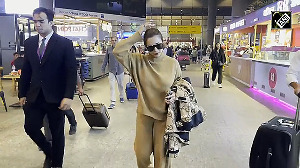 The CBI-IB tussle in the Ishrat Jahan encounter case is an avoidable conflict, says V G Vaidya
The CBI-IB tussle in the Ishrat Jahan encounter case is an avoidable conflict, says V G Vaidya
The Congress in half panic following the Narendra Modi juggernaut… the Janata Dal-United deserting the National Democratic Alliance in a struggle to preserve its secular fig leaf… the Bharatiya Janata Party jettisoning the L K Advani burden…; the media could not have asked for a headier cocktail in the run up for the next general election.
Yet it got more! And the press expose of the Central Bureau of Investigation probe into the alleged ‘fake encounter’ killing of Ishrat Jahan produced the requisite punch. The CBI went to the extent of implicating a very senior officer of the Intelligence Bureau.
Investigating under the scrutiny of the Gujarat high court, one can understand CBI’s anxiety to provide a fool proof case. But in doing so it apparently went overboard forgetting that it also ought to have displayed certain professional etiquette and finesse. It proceeded to interrogate the officer of the IB to establish, what it perceived was his complicity and excessive involvement leading to the alleged fake encounter that killed Ishrat along with three others. The CBI’s actions received (or inspired) media publicity pitting the two vital security outfits of the country against each other. This is nothing short of a disaster.
The IB, the Research and Analysis Wing, the CBI and other security agencies are members of a security family of the country. In the course of their functioning it is natural and possible for any of them to tread on the other’s toes. In such eventuality it is incumbent upon their leadership to put their heads together and iron out the differences. The offices of the heads of IB and the CBI are just 50 metres apart in the same corridor of the home ministry in New Delhi. It was possible for the director, CBI to informally get in touch with his IB counterpart, discuss an IB officer’s alleged involvement they suspected and deal with the case with adequate finesse, maturity and professionalism. But no, it seems this did not happen.
On the other hand the CBIs actions became public and appeared daily in the press. And, unfortunately, it even defended its line of investigation before the press claiming that it had definite proof of the IB officer’s complicity in the case. It went as far as to draw adverse inferences from his frequent contacts with Gujarat government functionaries and alleged his ‘generating’ the desired intelligence leading to the encounter. The arguments supporting such insinuations are ridiculous, to say the least.
It needs to be appreciated that IB’s sharing of intelligence with concerned ministries or security agencies is a very delicate matter. According to the GoI’s rules of business, need to ensure security of the source as also professional requirement, the director, IB is neither bound nor required to reveal the sources of his information. Nobody can ask for it. It is a matter of common sense that if this rule is not followed the entire intelligence network in the country will collapse.
Viewed against this background one wonders how the CBI, an agency working under and following the same security philosophy, proceeded to question the IB officer about Ishrat Jehan (with whom he nursed no prejudice or enmity). Who gave the dubious go ahead to the CBI to take this path?
Another, very crucial fact to be clearly understood, is that IB is a purely inquiry outfit. It does not have police powers. It works through its informers, agents and other technical tools to collect information having bearing on national security. This is one of the reasons why its findings are viewed with respect and credibility. Once the clues relating to national security are processed and found credible the IB provides them to the concerned agencies for further follow up actions.
Now, in these follow ups it is natural, and even necessary for the IB to liaise with that agency. In the Ishrat Jahan case the very life of Gujarat CM Narendra Modi was involved. IB’s joint directors in charge of its field units in the states do not work under the concerned chief ministers; nor are they answerable to the CM. They however do maintain contacts with the CM and the state police which is a professional requirement. Political loyalties of the CM are irrelevant.
The joint director functions under exclusive control and guidance of the IB headquarters. So, what is criminal or wrong in maintaining such a contact in this case? The CBI drawing farfetched inferences are simply crazy.
It is well known that police officers are reluctant to work in the CID or the IB. Also there is a general reluctance to go on deputation to the central government. Added to that, the IB is very selective and meticulous in choosing IPS officers for such deputations. The organisation therefore functions on the professional competence and dedication of those who stick to it. They have professional pride and not given to such ‘concoctions’ which the CBI has alleged. That is why intelligence agencies in other countries have respectful regards for it (howsoever much we may condemn it at home).
If in the context of this disturbing reality we keep hounding out IB officers its rank and file will soon lose their motivation and enthusiasm for delicate and challenging intelligence operations. Can the country afford it? Just for comparison sake, see how the US is defending its ‘snooping’ operations. Well, the country which prides on its intelligence geniuses has now come to such a sorry pass. It is necessary for the prime minister to step in and firmly curb this trend. Will he?
Reverting to the Ishrat Jehan case, the CBI got a rap on its knuckles on June 14 when the Gujarat high court advised it to concentrate on finding out the genuineness or otherwise of the encounter rather than wasting its energies over IB’s degree of involvement in it.
The case occurred in 2004. From where and how comes this sudden burst of investigative activity on CBI’s part when the country is on the threshold of a general election? (Remember CBI was called a parrot recently)? Politicians have enough issues to exploit in the pre-election free for all. They would be better advised to stay away from this one for the country’s sake. But do they listen? No chance. For them the vote bank is of paramount importance as of now.
V G Vaidya is former director, IB. His email: vaidyavg@hotmail.com.










 © 2025
© 2025